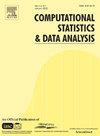Empirical likelihood based Bayesian variable selection
IF 1.6
3区 数学
Q3 COMPUTER SCIENCE, INTERDISCIPLINARY APPLICATIONS
引用次数: 0
Abstract
Empirical likelihood is a popular nonparametric statistical tool that does not require any distributional assumptions. The possibility of conducting variable selection via Bayesian empirical likelihood is studied both theoretically and empirically. Theoretically, it is shown that when the prior distribution satisfies certain mild conditions, the corresponding Bayesian empirical likelihood estimators are posteriorly consistent and variable selection consistent. As special cases, the prior of Bayesian empirical likelihood LASSO and SCAD satisfy such conditions and thus can identify the non-zero elements of the parameters with probability approaching 1. In addition, it is easy to verify that those conditions are met for other widely used priors such as ridge, elastic net and adaptive LASSO. Empirical likelihood depends on a parameter that needs to be obtained by numerically solving a non-linear equation. Thus, there exists no conjugate prior for the posterior distribution, which causes the slow convergence of the MCMC sampling algorithm in some cases. To solve this problem, an approximation distribution is used as the proposal to enhance the acceptance rate and, therefore, facilitate faster computation. The computational results demonstrate quick convergence for the examples used in the paper. Both simulations and real data analyses are performed to illustrate the advantages of the proposed methods.
基于经验似然的贝叶斯变量选择
经验似然是一种流行的非参数统计工具,它不需要任何分布假设。从理论和实证两方面研究了贝叶斯经验似然法进行变量选择的可能性。从理论上表明,当先验分布满足一定温和条件时,相应的贝叶斯经验似然估计量后验一致,变量选择一致。作为特殊情况,贝叶斯经验似然LASSO和SCAD的先验满足这些条件,能够以接近1的概率识别出参数的非零元素。此外,对于山脊、弹性网和自适应LASSO等其他广泛使用的先验算法,也很容易验证这些条件是否满足。经验似然依赖于一个参数,该参数需要通过数值求解非线性方程来获得。因此,后验分布不存在共轭先验,导致MCMC采样算法在某些情况下收敛速度较慢。为了解决这一问题,建议采用近似分布来提高接受率,从而加快计算速度。计算结果表明,本文所用算例具有较快的收敛性。仿真和实际数据分析表明了所提方法的优越性。
本文章由计算机程序翻译,如有差异,请以英文原文为准。
求助全文
约1分钟内获得全文
求助全文
来源期刊

Computational Statistics & Data Analysis
数学-计算机:跨学科应用
CiteScore
3.70
自引率
5.60%
发文量
167
审稿时长
60 days
期刊介绍:
Computational Statistics and Data Analysis (CSDA), an Official Publication of the network Computational and Methodological Statistics (CMStatistics) and of the International Association for Statistical Computing (IASC), is an international journal dedicated to the dissemination of methodological research and applications in the areas of computational statistics and data analysis. The journal consists of four refereed sections which are divided into the following subject areas:
I) Computational Statistics - Manuscripts dealing with: 1) the explicit impact of computers on statistical methodology (e.g., Bayesian computing, bioinformatics,computer graphics, computer intensive inferential methods, data exploration, data mining, expert systems, heuristics, knowledge based systems, machine learning, neural networks, numerical and optimization methods, parallel computing, statistical databases, statistical systems), and 2) the development, evaluation and validation of statistical software and algorithms. Software and algorithms can be submitted with manuscripts and will be stored together with the online article.
II) Statistical Methodology for Data Analysis - Manuscripts dealing with novel and original data analytical strategies and methodologies applied in biostatistics (design and analytic methods for clinical trials, epidemiological studies, statistical genetics, or genetic/environmental interactions), chemometrics, classification, data exploration, density estimation, design of experiments, environmetrics, education, image analysis, marketing, model free data exploration, pattern recognition, psychometrics, statistical physics, image processing, robust procedures.
[...]
III) Special Applications - [...]
IV) Annals of Statistical Data Science [...]
 求助内容:
求助内容: 应助结果提醒方式:
应助结果提醒方式:


